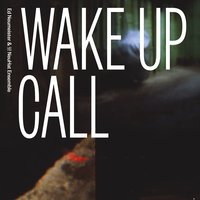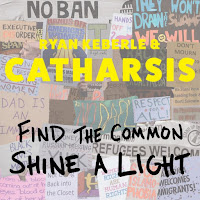 Into the fray this year came pianist, composer, and educator Vijay Iyer. He put together an amazing Sextet - Steve Lehman (alto saxophone), Mark Shim (tenor saxophone), Graham Haynes (cornet, flugelhorn, electronics), Stephan Crump (bass) and the indefatigable Tyshawn Sorey (drums) - and gave them music to really dig into. There are moments where the fire coming from the rhythm section may overwhelm your speakers but that note how the horns continue to ride those waves. Note the subtle work of Graham Haynes, the occasional forays into Fender Rhodes (few pieces this year funkier than "Nope"), and how the leader pushes, persuades, and often lets loose with torrents of notes that match the intensity of Crump and Sorey. It's not all "sturm and drang" but this album, titled "Far From Over" (ECM Records) grabs ahold of the mind, shakes it, and reminds us to stay involved.
Into the fray this year came pianist, composer, and educator Vijay Iyer. He put together an amazing Sextet - Steve Lehman (alto saxophone), Mark Shim (tenor saxophone), Graham Haynes (cornet, flugelhorn, electronics), Stephan Crump (bass) and the indefatigable Tyshawn Sorey (drums) - and gave them music to really dig into. There are moments where the fire coming from the rhythm section may overwhelm your speakers but that note how the horns continue to ride those waves. Note the subtle work of Graham Haynes, the occasional forays into Fender Rhodes (few pieces this year funkier than "Nope"), and how the leader pushes, persuades, and often lets loose with torrents of notes that match the intensity of Crump and Sorey. It's not all "sturm and drang" but this album, titled "Far From Over" (ECM Records) grabs ahold of the mind, shakes it, and reminds us to stay involved. Speaking of grabbing ahold of a tiger. alto saxophonist Rudresh Mahanthappa self-released his new Indo-Pak Coalition album "Agrima", selling to only as a digital-download from his website. With long-time companions Rez Abbasi (guitar, pedals) and Dan Weiss (tabla, drum kit), the album explores numerous musical motifs that show the influence of nations that give the band its name as well as nodding towards the Mahavishnu Orchestra. The interactions, the stop-on-a-dime and go in a new direction, the amazing work of Weiss, and the sounds that emanate from the guitar and saxophone (the first time Mahanthappa has recorded with synths), all that as well as the wonderfully drawn compositions makes "Agrima" a joy to hear. Try and sit still!
Drummer Weiss is also part of the quartet saxophonist and composer David Binney gathered to record "The Time Verses" (CrissCross Records). Binney has used Weiss, bassist Eivind Opsvik, and pianist Jacob Sacks as his working group in New York City's 55 Bar for a number of years. The narrative of the album is a "day in the life" of a working musician but you do need to know that to really dig into this music. Always a powerful soloist, Binney has quite the ear for melody. There's a poetic feel to pieces such as "Walk", "Seen" (with lovely vocal from guest Jen Shyu), and the episodic "Where Worlds Collide." Spend time with these "verses" and your spirit will be refreshed.
September of this year was quite a month for pianist, composer, and now author Fred Hersch. Jazz at Lincoln Center invited him to perform his "Leaves of Grass" suite, his memoir "Good Things Happen Slowly: A Life In and Out of Jazz" was published to very positive reviews, and his new solo piano album "Open Road" (Palmetto) was released. What made this album stand out in the Hersch repertoire is not just the excellent interpretations of material by Antonio Carlos Jobim, Benny Golson, Billy Joel (!), and Thelonious Monk (no surprise there) but the three fascinating original pieces. One piece, "Through The Forest", runs nearly 20 minutes and covers so much territory without getting bogged down in cliches or at a loss for a through-line. In fact, what stands out is how outside of genre the music is (a nice way of saying don't pigeonhole the piece by calling it jazz, classical, or whatever.)
I am blessed to know pianist and educator Laszlo Gardony, one of the friendliest and most creative musicians one will ever meet. It makes such good sense to call his new solo piano album "Serious Play" (Sunnyside Records). If you have Professor Gardony in person, you know that he has great technique but never allows that to get in the way of serving the melody or the rhythm (he really knows how to create rhythm in his music). He also understand the blues so pieces such as "Georgia On My Mind" and "Over The Rainbow" are ripe with honest emotions. Each track stands out yet the program feel connected from beginning to end. You can play this album over and over and hear something new each time.
Another person who is a "serious player" is Anat Cohen. If you have ever seen her in person, you know that the clarinetist (she also baritone sax on this CD) is rarely without a smile, that she can make the most "down-home blues" feel like a revival meeting, and she can genres in a heartbeat. This year saw three new releases including two with a Brazilian and one with her new Tentet. Arranged by Oded Lev-Ari, the music ranges from klezmer to Brazil to swing to deep ballads and to African balafon music. Her ensemble - Rubin Kodheli (cello), Nadje Noordhuis (trumpet, flugelhorn), Nick Finzer (trombone), Owen Broder (baritone saxophone, bass clarinet), James Shipp (vibraphone, percussion), Vitor Gonçalves (piano, accordion), Sheryl Bailey (guitar), Tal Mashiach (bass), and Anthony Pinciotti (drums) - is excellent. One can tell this music is for the concert hall and larger clubs yet much of the time one wants to dance ("Kenedougou Foly" closes the program and I dare you to sit still.
Like the Jen Shyu, Rudresh Mahanthappa, Josh Nelson, and Tomas Fujiwara recordings, the second album from the Marta Sánchez Quintet has been sitting on my desktop for months (and playing while I was doing school work). Retaining the front line of alto saxophonist Roman Filiu and tenor saxophonist Jerome Sabbagh from her previous CD but with a new rhythm section of bassist Rick Rosato and drummer Daniel Dor, "Danza Imposible" (Fresh Sound New Talent) builds on the promise of her 2015 date titled "Partenika" (Ms. Sánchez has issued two earlier albums on Spanish labels). There is a "lightness of being" on several tracks where the reeds don't "blow" as much as sing while the rhythm section often has a dancing quality. Meanwhile the leader's piano contains both beauty and muscle - for example, "Flesh" builds off powerful chords yet retains a quiet center, especially in the impressionistic piano solo. The slightly off-kilter saxophones lead the title track and share the melody lines while the piano plays counterpoint with the drums and bass building the tension. Ms. Sánchez has written music for a group, not for soloists and a rhythm section; it's fun to hear how the different voices in the group play off each other. There are moments when the mood and freedom of movement reminds this listener of the classic Miles Davis 1965-68 Quintet and that's a good thing. You can really tell that this group enjoys playing together and that joy is contagious.
It took composer and arranger Ed Neumeister over three years, several grants, and an Indiegogo campaign to bring his new album "Wake Up Call" (Meistero Music) to fruition. Yet, this labor of love is anything but laborious. In fact, much of this music soars. The NeuHat Ensemble is composed of world-class musicians (many of whom have worked or play with the Vanguard Jazz Orchestra and the Maria Schneider Orchestra), it's so enjoyable when the musicians dig in to the well sculpted melodies and intelligent arrangements. There's a touch of Duke Ellington in "Locomotion" (the composer writes that the song is based on John Coltrane's "Dear Lord") while it's possible that "Birds of Prey" has some influence from Ms. Schneider's well-known hobby. This music sparkles with inventiveness, wit, and often has a gentler side that is soothing.
Saxophonists Dave Liebman and Joe Lovano came together in 2007 at the request of BBC Radio to celebrate the 40th anniversary of John Coltrane's passing. With a rhythm section of Phil Markowitz (piano), Ron McClure (bass), and Billy Hart (drums), The results of their musical endeavors can be heard on "Compassion: The Music of John Coltrane", beautifully packaged and mastered by Resonance Records. The six-song program features works for 1958 up until 1967's title track. Both saxophonists play extremely well, never attempting to imitate the muscular sound that Coltrane mastered yet still having great power. The rhythm section also plays with great fire, especially Hart. This quintet succeeds unmaking Coltrane's music sound timeless and fresh.
This year, Resonance Records released two albums from pianist Bill Evans featuring the rhythm section of Eddie Gomez (bass) and Jack DeJohnette (drums). Up until now, the only album with that lineup was Evans's Verve Lp "Bill Evans at The Montreux Jazz Festival." That recording won a GRAMMY in 1969 by which time the drummer was in the Miles Davis Group. "Another Time: The Hilversum Concert" was recorded seven days after Montreux and just two days after "Some Other Time: The Lost Session from the Black Forest", which Resonance released earlier this year. The albums are fairly similar though they have different material. The later recording seems livelier, punchier, as if the trio had a good dinner and were digging each other's company. Bill Evans remains quite popular 37 years after his passing and there are a lot of albums to choose from. The spark of inventiveness can be heard throughout "Another Time" and that makes the music infectious.
***************************************
That's a wrap, as they say, for 2017. These albums made me feel good while listening and writing; some even helped my mood get so much better. I was sick and hospitalized in July and early August so music really made my recuperation time move by. Thanks to the promoters and the publicists, thanks to my fellow writers for keeping me honest, and thanks to the artists for taking chances and not settling for just good! Thanks to you for reading and reacting. Be healthy, be safe, and be generous throughout the Holiday and into 2018. Change is all around us. We must be ready and resolute and never, ever, lose your sense of humor and love of music.
Richard










































